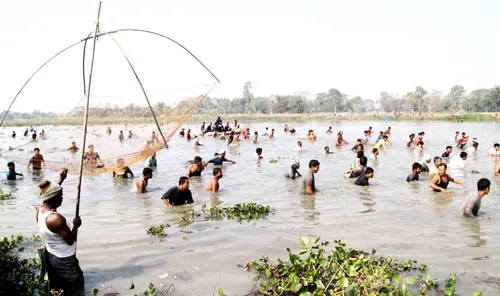Preparations are in full swing for the iconic Jonbeel Mela, one of Assam’s most cherished traditional fairs, set to take place in Morigaon district from January 16 to 18, 2024. Known for its ancient barter system and vibrant cultural festivities, the fair attracts visitors and participants from various parts of Assam and neighboring states every year.
A Unique Tradition Rooted in History
Jonbeel Mela, believed to have been celebrated since the 15th century during the reign of the Ahom kings, remains a living testament to Assam’s rich cultural heritage. The fair is named after the crescent-shaped lake, or Jonbeel, near which the event is held. Historically, it served as a marketplace where tribal communities from the hills and plains gathered to trade goods without the use of currency. This age-old barter system continues to be the central feature of the mela.
In this unique marketplace, tribal communities from regions such as Karbi Anglong, Meghalaya, and Arunachal Pradesh bring items like ginger, bamboo shoots, and turmeric to exchange for goods like rice, fish, and salt offered by locals from the plains. The mela fosters a sense of unity and mutual interdependence, showcasing the harmonious coexistence of diverse communities.
Preparations and Key Highlights
Organizers are leaving no stone unturned to ensure that this year’s Jonbeel Mela is a grand success. Local administrative bodies, in collaboration with cultural organizations, are working to enhance the visitor experience while preserving the authenticity of the event.
This year’s mela will feature the traditional Raj Darbar, a ceremonial gathering presided over by the Tiwa king, where disputes are resolved and community issues are discussed. The event symbolizes the enduring legacy of traditional governance practices among the Tiwa tribe.
In addition to the barter trade, the mela will host a vibrant cultural festival, showcasing folk music, dance, and traditional crafts. Artists from various ethnic communities will perform, offering a glimpse into the region’s rich artistic traditions. Food stalls serving local delicacies like pitha and doi-chira are expected to be a major draw, providing visitors with a taste of Assam’s culinary heritage.
Cultural and Economic Significance
Jonbeel Mela holds immense cultural significance as a celebration of Assam’s tribal and agrarian traditions. It is a reminder of the state’s ancient socio-economic practices and the enduring relevance of community-based trade. The barter system, in particular, has drawn the attention of anthropologists and historians, who view it as a fascinating example of an economy that predates modern currency-based transactions.
The mela also provides a boost to the local economy, attracting thousands of visitors, including tourists from other parts of India and abroad. Artisans, weavers, and small-scale traders benefit from the opportunity to sell their products, ranging from traditional textiles to handcrafted items.
Challenges and Opportunities
While Jonbeel Mela continues to thrive, it faces challenges such as the need for better infrastructure and waste management systems to handle the growing number of visitors. Organizers are addressing these issues by implementing measures to ensure cleanliness and sustainability during the event.
The mela also offers an opportunity to promote Assam’s cultural heritage on a global scale. With proper marketing and support from the government, Jonbeel Mela could become a major cultural tourism attraction, drawing more international visitors and contributing to the state’s economic development.
Jonbeel Mela is more than just a fair—it is a celebration of Assam’s cultural roots, a symbol of unity, and a testament to the region’s rich traditions. As preparations progress, the excitement among locals and visitors alike is palpable. This year’s event promises to be a memorable experience, blending ancient customs with modern festivities, and highlighting the timeless charm of Assam’s heritage.
The continuation of such traditions amidst changing times is a testament to the resilience and pride of the communities that have nurtured them for generations. Jonbeel Mela stands as a beacon of cultural preservation, reminding the world of the beauty and simplicity of age-old practices.


